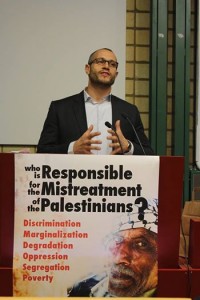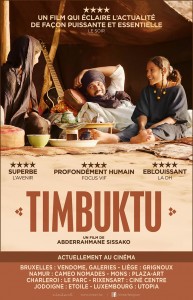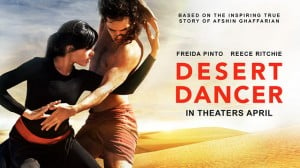Hany Abu-Assad’s film Omar (2013) has been described as “a film about love in the face of grueling adversity,” with the various obstacles facing the young couple symbolized by the very literal obstacle of the separation wall that meanders into the West Bank, cutting off Palestinian areas from each other. Omar routinely scales the wall to meet up with Nadja, but as Abu Assad puts it in an interview: “This is the outside obstacle, because the inside obstacle between the two lovers is trust.”
The obstacle of trust isn’t just between Omar and Nadja, however. In fact, the focus is more on Omar’s relationships with his childhood friends Tarek and Amjad, and with Rami, his Israeli handler. Nadja’s role might be described as a largely symbolic one. This was pointed out to Abu Assad, in a Q&A session, by an Arab woman in the audience. To translate her words, in Arabic, close to the end of this video of the Q&A session:
“I am writing a study of women’s representations in Palestinian cinema, and I see that the woman in this film is depicted negatively…she is the victim of men as well as the occupation that uses her against them.”

In responding, Abu Assad admitted that Nadja’s role was “passive.” Reasonably enough, he went on to say that you can’t tell all the stories all the time, and that this particular film was focused on Omar’s story. As he says elsewhere in an interview:
“I like movies that deal with trapped men. Men that need to make choices that are not obvious or easy choices…You create this character conflicted between two sides, because drama is about the conflict of two things, between your duty and your will, between what you want and what you can’t have.”
Abu Assad’s interest in the point of view of “trapped men” is evident in both Omar and his earlier film about two suicide bombers, Paradise Now (2005). However, an earlier film, Rana’s Wedding (2002), could be said to be about a “trapped woman,” Rana, who wakes up one morning to an ultimatum: to choose a husband from her father’s preselected list, or to leave Palestine for Egypt with her father that afternoon. Determined to stay in Palestine, Rana goes on a mission to marry the man of her own choosing.
There are, obviously, many films, novels, and plays about as well as by Palestinian women. The argument isn’t about whether there are enough Palestinian narratives from a woman’s point of view, but of how that perspective should be presented and how this impacts the “Palestinian question.” One example is the Palestinian rap group DAM’s 2012 music video, “If I Could Go Back in Time,” telling the story of a young woman killed by her father and brother for not marrying the man they chose for her. For two women, Lila Abu-Lughod and Maya Mikdashi, this song was a disappointment, and simplified complexities by buying into an ideologically motivated women’s rights discourse – in fact, it seemed to them that DAM had been “seduced by the Honor Crime”:
“Given DAM’s unapologetic and sophisticated political positions, it is surprising that when they decide to champion women’s rights, they succumb to an international anti-politics machine that blames only tradition for the intractability of (some) people’s problems. Why, when they decide to speak up about violence against women, do they suddenly forget the gritty and complex realities of life on the ground in the places they know?”

I can understand this point of view, having read and loved Abu-Lughod’s recent book, Do Muslim Women Need Saving? I see evidence of what Abu-Lughod critiques everywhere, in the work of those who seek to use rights discourse to score points, to further their advocacy, and this is certainly true in the case of Palestine. A prime example of this is The Jerusalem Institute of Justice ‘s “Palestinian Human Rights Week,” which is less about human rights than about how human rights can be used for ideological purposes. Its founder, Calev Myers, argues that it would be “within the human rights interest of the Palestinian refugees” to scrap UNWRA and to end their claim to the right of return. Myers also advocates the “recognition” of Gaza as a Palestinian State, and the annexing of “Judea and Samaria.” All of this is done through an appeal to the “human rights” of the Palestinians – as can be seen in the JiJ poster, featuring an elderly man with bloodshot eyes in a kuffiyeh. Above his head, the words: Who is responsible for the mistreatment of Palestinians?
Apparently, the Palestinians themselves, along with the rest of the Arab world.
To further this narrative, Myers appears regularly to participate in “debates” – such as this one, in which he “debates” an Algerian woman on Arab women’s rights, while she agrees vehemently with everything she says. In the face of such twisting of rights discourse, some might be forgiven for arguing that we need to be careful in raising the issue of “women’s rights.” But in fact, it is through self-critique that we can best pull the rug out from underneath those who do abuse the discourse of “human rights” and “women’s rights” to present simplistic and ideological narratives about victims and perpetrators. As Nehad Khader put it, in a different article about DAM’s 2012 song:
“the local and indigenous discussion of domestic violence and crimes against women among Palestinians forces society to seriously address the issue at hand. It does so by complicating the false reductionist binary that positions the Arab woman as perpetual victim and the Arab man as perpetual perpetrator.”
As it is, Omar is a great film, as was recognised when it was selected as the Palestinian entry for the Best Foreign Language Film, where for the first time, it was a film from “Palestine,” not the Palestinian Territories. This is something to celebrate. And I do feel that sometimes the question of the “missing voice” can be misplaced. We might want all the missing voices all the time, a smorgasbord of every available narrative, but to tell a particular story you need a particular perspective. For example, the question of the “missing woman’s voice” has been put to another film about Palestinian experience, A World Not Ours, a documentary about the refugee camp Ain el Hilweh. In this Q&A session, someone asked why women are not given a voice. The producer responded by saying that while it wasn’t a conscious choice, the perspective makes the film “an interesting exploration of masculinity in the camp, across different generations.” Another recent film about Syria, Return to Homs, has faced similar questions, although it is a story about a “frontline” where no women were present.
Let’s say that Omar tells a particular story which requires the focus on the central character. I think that’s true – but that there were still ways to make Nadja’s character more than a symbolic cipher. So I am glad the woman in the audience asked the question about Nadja’s passivity – because it’s about time we recognize that we can push the boundaries in multiple directions.











